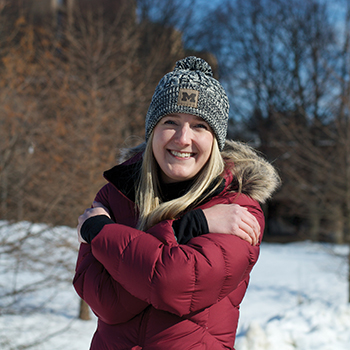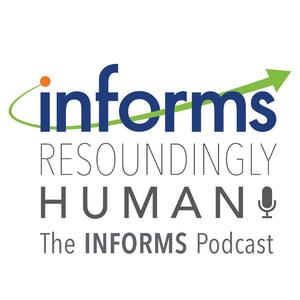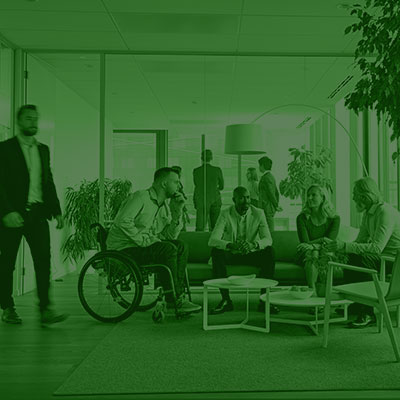Published: March 4, 2023

We’re coming up on International Women’s Day on March 8 and here at INFORMS we’re excited to recognized and celebrate the incredible contributions of women in STEM! This year’s theme is Embrace Equity, highlighting how embracing gender equity will help create an inclusive world. Joining me to explore the growing impact of women in the STEM fields, and share her own incredible work is Lauren Czerniak, a PhD candidate with the University of Michigan. Lauren’s research focuses on developing and applying stochastic models to address current challenges in healthcare with applications in pharmaceutical drugs, glaucoma, and concussion management. In addition to her incredible work in industrial and operations engineering, Lauren is a tremendous advocate and mentor for other women in STEM.
First I’d like to wish everyone a happy International Women’s Day, and also I’d like to share that I encourage everyone to find what you're passionate about and what you love and pursue that, and I’m glad and grateful that I can be doing that here at the University of Michigan.
Interviewed this episode:

Lauren Czerniak
University of Michigan
Lauren Czerniak is an Industrial and Operations Engineering Ph.D. student at the University of Michigan where she is being co-advised by Dr. Mark Daskin and Dr. Mariel Lavieri. Her research focuses on developing and applying stochastic models to address current challenges in healthcare with applications in pharmaceutical drugs, glaucoma, and concussion management. She is a Rackham Merit Fellow and a recipient of the National Science Foundation Graduate Research Fellowship. Feel free to check out her website to learn more about her interests, research, teaching, and outreach.
Related Episodes
Episode Transcript
Ashley Kilgore:
We’re coming up on International Women’s Day on March 8th, and here at INFORMS we’re excited to recognize and celebrate the incredible contributions of women in STEM. This year’s theme is, embrace equity, highlighting how embracing gender equity will help create an inclusive world. Joining me to explore the growing impact of women in the STEM fields and share her own incredible work is Lauren Czerniak, a PhD candidate with the University of Michigan.
Lauren’s research focuses on developing and applying stochastic models to address current challenges in healthcare with applications and pharmaceutical drugs, glaucoma, and concussion management. In addition to her incredible work in industrial and operations engineering, Lauren is a tremendous advocate and mentor for other women in STEM. Lauren, it is such a pleasure to have you on the Resoundingly Human Podcast.
Lauren Czerniak:
It’s such a pleasure to be here this morning and talking with you about my research and about why I’m an advocate for women in stem.
Ashley Kilgore:
So Lauren, to start us off, I’d love to learn how you came to be in the field of ORMS.
Lauren Czerniak:
Yeah, so that’s a great question. So growing up throughout elementary, middle, high school, I always had a passion for mathematics. And I knew that I definitely wanted to pursue a degree that was heavily based on math. So this ultimately guided me to pursue my bachelor’s degree in industrial engineering at the University of Pittsburgh. And so during my time through my undergraduate degree, I was really intrigued by topics in classes like probability, deterministic and probabilistic operations research, and simulation. And I could really see how these methods and ideas could be applied to real world problems.
And so when I was thinking about after I was done with my undergraduate career, what I wanted to do, I decided to pursue my PhD because I wanted to pursue research where I could make impactful contributions to different areas. And ultimately, my research did lead me to a healthcare application areas in general. But that’s kind of ultimately probably my passion for math really is what guided me to our ORMS fields.
Ashley Kilgore:
So Lauren, I’d love to take a closer look at your own work. Can you walk us through some of the research you’re doing?
Lauren Czerniak:
Yeah, sure. So, I’d be happy to. So like I was sharing, I do focus on research that is all in the area of healthcare. And so like you shared in my introduction, I look at different problems with pharmaceutical drugs, concussion management, and glaucoma. So I thought I could talk a little bit about my pharmaceutical drug work and my concussion management work today.
So, my pharmaceutical drug work is actually what creates my dissertation for my PhD. And so in this setting, what we’re interested in is that there’s some key characteristics when you’re looking at a hospital pharmacy inventory system. The first thing that we’re interested in is that we have supply chain disruptions. And so what that means is, we have these random and potentially long periods of time where a hospital pharmacy’s unable to receive a particular drug. And so the key reason why we want to think about these supply chain disruptions when we’re making inventory decisions is that we can ultimately have drug shortages. Whereas, you really want to have the drug on your shelf when the patient needs it. And so, we want to definitely be considering supply chain disruptions when we’re making inventory decisions.
Now, another key characteristic that we think about in this research is the idea that drugs have a finite lifetime. So hospital pharmacy managers can’t be like, “I want to make sure I have that drug on my shelf for my patient, so I’m going to keep 10 years of inventory of drug on hand.” But with them having this finite lifetime, we want to make sure that we’re not stocking too much, such that we would have waste in our system.
Now the final key characteristic that we have that really kind of ties together all of my dissertation work, is this idea that a hospital pharmacy doesn’t make a decision for just one particular drug. It actually makes decisions for like here at the University of Michigan’s central pharmacy, they make decisions for over 2,500 drugs. And so this really emphasizes that we need models and methodologies that can be quick to solve. And so that’s kind of the work in a nutshell, what I work on for my dissertation research.
Now, the other area of research that I wanted to chat a little bit about today on our podcast was concussion management. And so here, we look at NCAA athletes and military cadets across 30 different institutions. And we really answer questions around, what’s the diagnostic accuracy of different assessments? So, things like neurocognitive exams. And how can that help us assess whether a participant or athlete is concussed or not?
And then another area of research that we look within the concussion management sector is, when do we actually let an athlete or military cadet return to play after they do have a concussion? And so this is an interesting area because it’s dependent on many different factors in this setting. So it might be dependent on the gender or the sport that the participant’s playing.
So to give you a concrete example, I have nothing against golfers, but I actually love golfing myself. But if you have a male golfer versus a male football player, you might be more inclined to let the male golfer return to play earlier than that male football player because they’re at less risk of getting another concussion in the future. And so what we do is we develop models to actually numerically be able to say, when should you let your athlete return to play after they did have a concussion?
Ashley Kilgore:
Wow. So I’d love to hear how you became interested or connected to these specific areas of study. They sound incredibly rewarding.
Lauren Czerniak:
Yeah. So, I absolutely love working in the area of healthcare. And I often say this because I’m not a person that I could ever go to school to be a surgeon or a nurse or a doctor. I’d probably be passed out in the operating room and you probably don’t want me taking care of you. But what I love about operations research in the management sciences is it allows me to give back to the healthcare field without having to be in that operating room or that hospital setting in general. I get to work with great people, great collaborators, clinicians, and pharmacists and things of that nature. But I don’t actually have to see anything in the setting.
But yeah, so I can go back to your question though of how I actually got intrigued by this area. And it was actually because I was a patient myself in the healthcare system, starting my sophomore year of undergraduate. And it actually took me until my senior year probably of undergraduate, that I started to feel better. And I actually still have complications today from the accident that I was involved in.
But what I had found through my recovery is that it’s incredibly important for patients to have access to the care that they need, and for optimal decisions to be made throughout the treatment of the patient. And so with these ideas in mind of me being a patient myself in the healthcare system, I really wanted to give back to the healthcare field. Since I couldn’t do it going to school and being a medical doctor or anything, I knew that operations research and the management sciences was a great way to give back to the healthcare field by using my passion for mathematics to solve problems in the area.
Ashley Kilgore:
Well, Lauren, thank you so much for sharing that. So now in addition to your research, you’ve held several positions in the Society of Women Engineers. Could you share with me how you became involved in this?
Lauren Czerniak:
Yeah, sure. So the Society of Women Engineers at the University of Pittsburgh is an absolutely great organization. And the key reason why I chose to get more involved in this organization is that during my Physics 2 course, during my freshman year of undergrad, I realized I was just one of few women sitting in the room. And so this had really encouraged me to get more involved in the organization. Because I had currently been a member in that, but I hadn’t been an officer or any kind of leadership roles in the organization. And I knew that I really wanted to grow my network with other women pursuing advanced STEM degrees. And so this ultimately encouraged me to get more involved in the society.
Ashley Kilgore:
So now, is this sort of the deciding factor that led you to be an advocate and mentor for other women in ORMS?
Lauren Czerniak:
Yeah, so this ultimately encouraged me to discover my true goal, which is to be an advocate for women intrigued by careers in stem. And so the key reason why this had evolved is that first, I started to grow my network with these other women intrigued by advanced… pursuing advanced STEM degrees. But also, I started participating in outreach events, which the Society of Women Engineers at the University of Pittsburgh hosts about four each semester. So that being both the fall semester and then they call it the spring semester, the January through April semester.
And so throughout these outreach events, you start engaging with these young women and realize, you can have an incredible impact on these women. If they can see that you can do it, they might think in their mind, “Oh, Lauren can do it, so I can also do it.” And so this started to come to me and be like, “You know what? You could really have an impact on these young women and encourage them to pursue whatever they’re passionate about.” So if they do love math, like myself, or they do love science, to go and pursue that. And so that’s ultimately some of these events. And through different roles in the society, I ultimately decided to want to be an advocate for women intrigued by stem.
Ashley Kilgore:
That’s terrific. So now I’d also love to hear how has your membership with INFORMS both helped you on your own professional journey as well as helped connect you with and further your role as a mentor for other women?
Lauren Czerniak:
Yeah, so INFORMS is absolutely amazing. And so the reason why I actually got very involved in the INFORMS student chapter here at the University of Michigan when I first joined the PhD program, was that, like I shared, I want to be an advocate for women. But when I came through to my PhD, I was like, “I could even cast my net a little bit wider. So not only be an advocate for women, but also other minority groups intrigued by stem.” And so I thought that INFORMS was a great way to do that. So, I got heavily involved in our chapter. I was secretary, vice president, president, and now I’m currently the past president of the organization.
And so through my roles, my leadership roles and also my participation in events and things of that nature, so things like participating in outreach events. The University of Michigan recently brought back what they call Explore and Discover Engineering Day where we get to expose fourth through 10th graders to engineering, and kind of be advocates for those minority groups and women interested in stem.
And then also I got to participate in mentorship programs. One year I actually got to lead the mentorship program. But with this mentorship program in particular, I was a mentor to three first year OIEP PhD students so far, one being a first generation college student and then two other being women. And so being able to share my advice and just being able to relate to them and just being able to allow them to share with me what they’re thinking as they go through the PhD process, that’s been a very rewarding experience for myself.
So from the STEM chapter level, I’ve been very grateful for how much the INFORMS… the organization has been able to do for me. From a broader level though, I’d also like to talk about the parent organization of INFORMS [inaudible 00:12:04]. And something for me that was very impactful and really helped me grow professionally was, I participated in what was called the, To My Younger Self mentorship program, which was a mentorship program that was sponsored by a DEI ambassadors project.
And so through this organization, it was that there was about 10 to 12 women pursuing PhDs and then also 10 to 12 faculty members across different parts of the world in that. And so through this program, I got to first grow my network with other peers. We were all pursuing PhDs, all women experiencing different challenges in the field. And so we really got to engage and meet one another and kind of share our experiences.
But then we were also paired with a mentor, so a faculty member at an institution where my faculty member was absolutely amazing. She shared so many great tips as she pursued her academic career and some challenges that she faced along the way and how she overcame those. And so it was such a rewarding experience, and I’m so grateful that I was a part of that.
And then also through other areas of more of the professional organization and broader organization of INFORMS, I’m also always intrigued by all the great initiatives that it has. And so in particular, I know one thing that the annual conference does is, it brings in undergraduates that Saturday before the conference starts. And during that time, these undergraduates are allowed to learn about the field of ORMS, maybe inspire them to pursue their PhD.
And through this program, I sat on the panel where I got to share my experience why I pursued a PhD. And like I said before, sometimes it only takes one person to encourage you to do something that they can see that they are doing it. So maybe they see themselves being able to do it in the future too. So, that’s kind of how INFORMS has helped me professionally and why I’m so grateful to be a part of the organization.
Ashley Kilgore:
So now Lauren, what guidance would you share for other women in the field, and even our allies who also want to have a positive impact on future generations?
Lauren Czerniak:
Yeah, so that’s a great question. So I actually have two areas of guidance for that. So the first one is that, don’t have too high of expectations for yourself. So whenever I go into different outreach events or different events in general, I don’t expect to have an impact on every single student in the room. It’s enough for… And if I do, that’s absolutely amazing. But if I have an impact on one student, my day’s made. And so that’s one thing that I would say for area of guidance is, don’t put too much pressure on yourself.
And then the other area of guidance would be, is if you do have the opportunity to interact with students individually, share your story and hear what their interests are and their passions are. I think that’s a great opportunity to make an impact on someone. So to give you a concrete example, during… it was Discover Engineering Day here at the University of Michigan. I had went up to one of the students and she was probably like an eighth grader. And she had told me how she didn’t want to do engineering. She loved makeup, she wants to work for a makeup company, and engineering’s just not her thing.
And so I started bringing up how at the University of Pittsburgh and actually through the Society of Women Engineers, that I actually got to meet the CEO of Estée Lauder, and her eyes got so wide. And I was like, “Yeah, so I actually got to meet the CEO. And there’s so many opportunities, whether you’re a chemical engineer and you actually want to go work with the composition of the makeup, or maybe you want to be an industrial engineer and make sure that Maybelline mascara is on the shelf whenever you go buy it at Target. There’s many different opportunities.” And so I think that I gave her a different perspective on maybe some passion she had. Maybe she does love makeup, but ultimately showing her, keep her options open and kind of discover different areas that might be of interest to her.
Ashley Kilgore:
So we’ll be posting this episode in conjunction with the INFORMS celebration of International Women’s Day. So before we wrap up, are there any special messages you’d like to share with our listeners for this year’s celebration?
Lauren Czerniak:
Yeah, sure. So first, I’d like to wish everyone a happy International Women’s Day. And then also I’d just like to share, I just encourage everyone to find what you’re passionate about and what you love and to pursue that. And I’m glad and grateful that I can be doing that here at the University of Michigan.
Ashley Kilgore:
That’s terrific. Thank you so much, Lauren.
Lauren Czerniak:
Great. Thank you so much for having me this morning on our call and everything. And I can’t wait to hear it and everything.
Ashley Kilgore:
Want to learn more? Visit resoundinglyhuman.com for additional information on this week’s episode and guest. The podcast is also available for download or streaming from Apple Podcasts, Google Play, Stitcher, and Spotify. Wherever you listen, if you enjoy Resoundingly Human, please be sure to leave a review to help spread the word about the podcast. Until next time, I’m Ashley Kilgore and this is Resoundingly Human.



